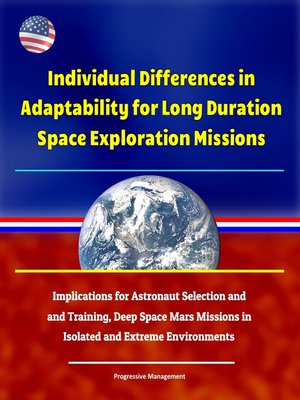Individual Differences in Adaptability for Long Duration Space Exploration Missions
ebook ∣ Implications for Astronaut Selection and Training, Deep Space Mars Missions in Isolated and Extreme Environments

Sign up to save your library
With an OverDrive account, you can save your favorite libraries for at-a-glance information about availability. Find out more about OverDrive accounts.
Find this title in Libby, the library reading app by OverDrive.



Search for a digital library with this title
Title found at these libraries:
| Library Name | Distance |
|---|---|
| Loading... |
This excellent report has been professionally converted for accurate flowing-text e-book format reproduction. As NASA prepares for long-duration, crewed missions into deep outer space, it needs to have a better understanding as to why some individuals adapt and adjust better than others to the extreme demands of space living. Drawing upon evidence from multiple sources, the present report identifies the factors associated with individual differences in adaptability to isolated, confined and extreme (ICE) environments, and discusses implications for selection and sustainment of astronauts on long-duration missions. While the present results do not permit a rank-ordering of the relative importance of these variables, we are fairly confident that the most relevant variables are contained within this set. Based on this preliminary evidence, we discuss some implications for astronaut selection and training, and provide suggested countermeasures for preserving adaptability during long-duration missions. Additional research is needed to improve measurement strategies, verify causal directions, and understand the complex interactions and underlying processes involved in positive human adaptation to the physical and psychosocial challenges of life in deep space.
Operational interviews largely confirmed the findings from the systematic review, while providing additional information regarding factors that may contribute to individual adaptability for long duration missions. Operational experts agreed on the importance of intelligence (especially practical intelligence); emotional stability; openness; achievement orientation; optimism; control; hardiness; past experience; sleep; physical - biological factors; and positive coping strategies.
They also reinforced the mixed results on extraversion-introversion, indicating it is important to have a balance between introverted tendencies (e.g., maintaining privacy and emotional control), and extraverted qualities (e.g., sociability and working in a team). Subject matter experts also believed it was beneficial to be balanced with respect to achievement tendencies on the one hand, and willingness to accommodate and accept other approaches. These are both facets of the "Big Five" personality factor conscientiousness. Our results thus indicate that in ICE environments, some features of conscientiousness and extraversion have a positive influence on adaptability, while others appear to be negative.
Conclusions: This evidence report identifies the key factors associated with individual adaptability in ICE environments. While the present results do not permit a rank-ordering of the relative importance of these variables, we are fairly confident that the most relevant variables are contained within this set. Based on this preliminary evidence, we discuss some implications for astronaut selection and training, and provide suggested countermeasures for preserving adaptability during long duration missions. Additional research is needed to improve measurement strategies, verify causal directions, and understand the complex interactions and underlying processes involved in positive human adaptation to the physical and psychosocial challenges of life in deep space.







